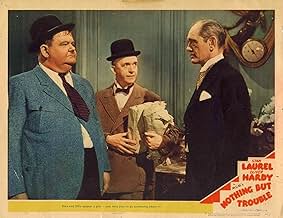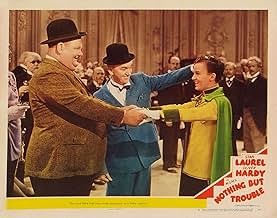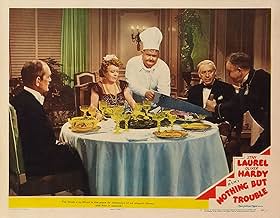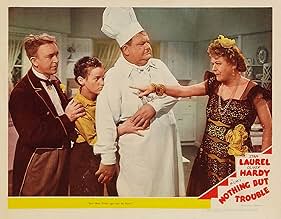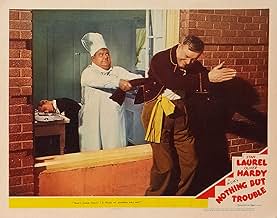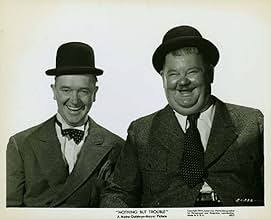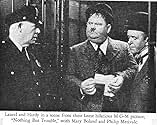NOTE IMDb
6,3/10
1,4 k
MA NOTE
Ajouter une intrigue dans votre langueTwo bumbling servants are hired by a dizzy society matron to cook and serve a meal to visiting royalty.Two bumbling servants are hired by a dizzy society matron to cook and serve a meal to visiting royalty.Two bumbling servants are hired by a dizzy society matron to cook and serve a meal to visiting royalty.
- Réalisation
- Scénario
- Casting principal
Ed Agresti
- Party Guest
- (non crédité)
Brandon Beach
- Party Guest
- (non crédité)
John Berkes
- Jones
- (non crédité)
Ted Billings
- Mission Guest
- (non crédité)
Tom Brannigan
- Willis
- (non crédité)
Cliff Clark
- Police Sergeant
- (non crédité)
Chester Clute
- Employment Office Clerk - 1944
- (non crédité)
Gino Corrado
- Mr. Kitteridge
- (non crédité)
Frank Darien
- Old Man
- (non crédité)
Avis à la une
Nothing But Trouble (1944)
** (out of 4)
Laurel and Hardy meet a young boy and soon they discover that he's really a King. The duo must protect the boy from a few people trying to kill him. Once again, I had heard this was a pretty bad film but while it's miles from Hal Roach material, the film contains a few laughs and has a little charm to it. It's too bad Warner isn't including this in their upcoming set but my recording from TCM, which seemed to be remastered, will do just fine. The best moment takes place in a zoo where L&H must try and steal a streak away from a lion. Another nice moment is when Laurel is trying to ref a football game. Most of the gags are lazy and fall on their face but the film is a decent time killer.
** (out of 4)
Laurel and Hardy meet a young boy and soon they discover that he's really a King. The duo must protect the boy from a few people trying to kill him. Once again, I had heard this was a pretty bad film but while it's miles from Hal Roach material, the film contains a few laughs and has a little charm to it. It's too bad Warner isn't including this in their upcoming set but my recording from TCM, which seemed to be remastered, will do just fine. The best moment takes place in a zoo where L&H must try and steal a streak away from a lion. Another nice moment is when Laurel is trying to ref a football game. Most of the gags are lazy and fall on their face but the film is a decent time killer.
All the great movie comics made poor comedies in comparison to their best ones. For every THE BANK DICK and IT'S A GIFT, W.C.Fields did a MRS. WIGGS OF CABBAGE PATCH or ALICE IN WONDERLAND. For every DUCK SOUP and A NIGHT AT THE OPERA, the Marx Brothers did a LOVE HAPPY or a STORY OF MANKIND. Chaplin's MODERN TIMES and MONSIEUR VERDOUX is "balanced" by A KING IN NEW YORK and A COUNTESS FROM HONG KONG. Keaton's THE GENERAL and SHERLOCK JR. have the negatives of WHAT, NO BEER or BOOM IN THE MOON. For all of Abbott and Costello's THE TIME OF THEIR LIVES or BUCK PRIVATES, one has to look at DANCE WITH ME HENRY.
The same with Laurel & Hardy. Their last ten films, for M.G.M. and 20th Century Fox are dismissed. I think the reason is that these films lack the atmosphere built up by Hal Roach and his production staff. But what is forgotten is how often Roach and Laurel (the real creative half of the team) failed to agree on film production. SWISS MISS appears to have been butchered, in part, by Roach. There are probably other examples, particularly as Laurel wanted more expensive budgets on his films (such as the nightclub in OUR RELATIONS) while Roach constantly tried to clamp down on expenses.
When they joined MGM Laurel & Hardy were still quite popular, but the leading comic team of that moment (1941) was Universal's Abbott & Costello. Though similar in physical juxtaposition (thin Stan and Bud v. fat Ollie and Lou) the personalities were widely different. Stan was not a wise guy like Bud Abbott, and Ollie had more misplaced self-confidence than timid Lou Costello). But the films that were given to them were somewhat like those of Abbott & Costello. The latter's BUCK PRIVATES is mirrored in L & H's GREAT GUNS. It was like the MGM studio did not really know what to do with them - and probably that is true. Don't forget how Louis B. Mayer had little sympathy with comedians - witness his actions against the Marx Brothers and Buster Keaton. Why should Laurel & Hardy get any better treatment? The last ten films then have to be judged by this background of neglect. As such, one looks for whatever is positive in them. Sometimes it is surprising.
SPOILERS COMING UP The best moments in NOTHING BUT TROUBLE deal with Stan and Ollie trying to cook and serve their employers (Henry O'Neill and Mary Boland), and the conclusion with Philip Merivale's poisoning plot against his nephew. The business with Stan offering a saw to cut the piece of purloined steak is wonderful. But the business with Merivale is quite unique.
It is similar to the situation in the Marx Brothers' THE BIG STORE, where in the concluding chase in the store Douglas Dumbrille, the film's villain, starts taking over the comic punctuation of the sequence, and carries them off quite well (in fact, he takes over the film). Here Merivale does, in particular when the poisoned canapé is mixed up so thoroughly by the boys that Merivale does not know which important social/political/financial figure at the party is going to eat the poisoned piece. Momentarily he thinks it is Mary Boland, but it just appears she swallowed the wrong way. But Merivale goes through the tortures of the damned until the end of the sequence. And, as it turns out, there is a neat wrap up to the matter just before the film concludes.
It is sort of symptomatic to the trouble of Mayer's lack of concern approach with his pure humorist - he so did not care about the actual finished product, that he was willing to let the film's villains take over the comedy. It makes one appreciate Merrivale more, just like THE BIG STORE makes one regard Dumbrille more highly. But it really does not add much luster to L & H anymore than the other added to the reputations of the Marx Brothers.
The same with Laurel & Hardy. Their last ten films, for M.G.M. and 20th Century Fox are dismissed. I think the reason is that these films lack the atmosphere built up by Hal Roach and his production staff. But what is forgotten is how often Roach and Laurel (the real creative half of the team) failed to agree on film production. SWISS MISS appears to have been butchered, in part, by Roach. There are probably other examples, particularly as Laurel wanted more expensive budgets on his films (such as the nightclub in OUR RELATIONS) while Roach constantly tried to clamp down on expenses.
When they joined MGM Laurel & Hardy were still quite popular, but the leading comic team of that moment (1941) was Universal's Abbott & Costello. Though similar in physical juxtaposition (thin Stan and Bud v. fat Ollie and Lou) the personalities were widely different. Stan was not a wise guy like Bud Abbott, and Ollie had more misplaced self-confidence than timid Lou Costello). But the films that were given to them were somewhat like those of Abbott & Costello. The latter's BUCK PRIVATES is mirrored in L & H's GREAT GUNS. It was like the MGM studio did not really know what to do with them - and probably that is true. Don't forget how Louis B. Mayer had little sympathy with comedians - witness his actions against the Marx Brothers and Buster Keaton. Why should Laurel & Hardy get any better treatment? The last ten films then have to be judged by this background of neglect. As such, one looks for whatever is positive in them. Sometimes it is surprising.
SPOILERS COMING UP The best moments in NOTHING BUT TROUBLE deal with Stan and Ollie trying to cook and serve their employers (Henry O'Neill and Mary Boland), and the conclusion with Philip Merivale's poisoning plot against his nephew. The business with Stan offering a saw to cut the piece of purloined steak is wonderful. But the business with Merivale is quite unique.
It is similar to the situation in the Marx Brothers' THE BIG STORE, where in the concluding chase in the store Douglas Dumbrille, the film's villain, starts taking over the comic punctuation of the sequence, and carries them off quite well (in fact, he takes over the film). Here Merivale does, in particular when the poisoned canapé is mixed up so thoroughly by the boys that Merivale does not know which important social/political/financial figure at the party is going to eat the poisoned piece. Momentarily he thinks it is Mary Boland, but it just appears she swallowed the wrong way. But Merivale goes through the tortures of the damned until the end of the sequence. And, as it turns out, there is a neat wrap up to the matter just before the film concludes.
It is sort of symptomatic to the trouble of Mayer's lack of concern approach with his pure humorist - he so did not care about the actual finished product, that he was willing to let the film's villains take over the comedy. It makes one appreciate Merrivale more, just like THE BIG STORE makes one regard Dumbrille more highly. But it really does not add much luster to L & H anymore than the other added to the reputations of the Marx Brothers.
NOTHING BUT TROUBLE (Metro-Goldwyn-Mayer, 1944), directed by Sam Taylor, stars the comedy team of Stan Laurel and Oliver Hardy in a movie title that best described their style of comedy - nothing but trouble. For their final feature for MGM, and on loan from their current home base of 20th Century-Fox, NOTHING BUT TROUBLE may not come close to the style of comedies the team did best while under Hal Roach/MGM in the 1930s, but at least it is a slight improvement over their recent disappointing comedies they were doing at that time. Compare to the Chevy Chase 1991 edition to NOTHING BUT TROUBLE, this Laurel and Hardy edition is a comedy masterpiece.
Combining two stories that would eventually come together as one, the opening starts with Laurel and Hardy with a prologue set during the Depression era of 1932 "when jobs were as hard to find as a girdle on a welder." Stanley and Oliver come to the Lorrison Employee Agency where they wait on long lines looking for employment as chef and butler. Without any luck, they come to the decision of going elsewhere, overseas as to France, Italy and Japan where Oliver attempts to showcase his steak a la Oliver, but with no success. Twelve years later, 1944, "where jobs were as easy to find as a girdle on a welder," Stan and Ollie return to the United States where their wait among the crowds at the Lorrison Employee Agency is no different as it was in 1932. They do, however, get hired by Mrs. Elvira Hawkley (Mary Boland), a society woman looking for a cook and a butler to help prepare dinner for a visiting king and his uncle. The second story focuses on Christopher (David Leland), a teenage boy king from Orlandra accompanied by his uncle, Prince Saul (Philip Merivale) visiting the United States. Chris, who would like nothing more than to be like any other boy his age by going out freely and playing football. He is unaware that his uncle is arranging to have him accidently killed off so to place the blame on his political opponent. While walking in the park with his secretary, Roentz (John Warburton), who is in on the assassination attempt, Chris unwittingly disappears to play football with the other boys. Because the team needs referees, Chris talks Laurel and Hardy, returning home with groceries, to assist in the game. Because Oliver forgot to buy the main course meal of steak, Chris helps the twosome obtain a great piece from a lion's cage at the zoo. Upon their return to the mansion where Oliver prepares his steak a la Oliver, he and Stan find Chris hiding in the kitchen. Following the dinner where Mrs. Harkley and her husband (Henry O'Neill) entertain Chris's uncle, Prince Saul, Mrs. Harkley discovers Chris running from under the table, mistaking him for a street urchin. Laurel and Hardy get fired when Mrs. Harkley find the boy associated with them. Further trouble lies ahead when Stan and Ollie are accused and arrested for Chris's abduction, and more trouble when they learn what Chris's uncle intends to do with the boy.
Others in the cast include: Matthew Boulton (Prince Prentiloff); Connie Gilchrist (Mrs. Flanagan); Robert Emmett O'Connor, Paul Porcasi, Robert E. Homans, Chester Clute and Joe Yule. Surprisingly, David Leland, in his only major role as the teenage boy king, and few movie roles to his credit, had died at the age of 16 in 1948. One wonders had he lived, would he had been MGM's answer to popular European imports as the British Freddie Bartholomew of the 1930s or 20th Century-Fox's Roddy McDowall of the 1940s.
Not quite up to the current comedies by Abbott and Costello, who make Laurel and Hardy seem to be a comedy team of the past, NOTHING BUT TROUBLE is a typical mix of sentiment and humor in the MGM mode. NOTHING BUT TROUBLE includes some amusing bits such as Oliver's attempt in cutting the steak at the dinner table. The climatic window ledge sequence which comes reminiscent to the Harold Lloyd comedies of the 1920s, should have been a height of hilarity, but comes off forced and silly. Mary Boland is amusing as always, but one cannot help but wonder how that same role might have been pulled off had the deadpan Margaret Dumont, a popular foil in Marx Brothers comedies, been handled. For its 70 minutes, NOTHING BUT TROUBLE is often accepted as one of Stan and Ollie's finer comedies of the 1940s, especially by devotees of their work. (** steaks)
Combining two stories that would eventually come together as one, the opening starts with Laurel and Hardy with a prologue set during the Depression era of 1932 "when jobs were as hard to find as a girdle on a welder." Stanley and Oliver come to the Lorrison Employee Agency where they wait on long lines looking for employment as chef and butler. Without any luck, they come to the decision of going elsewhere, overseas as to France, Italy and Japan where Oliver attempts to showcase his steak a la Oliver, but with no success. Twelve years later, 1944, "where jobs were as easy to find as a girdle on a welder," Stan and Ollie return to the United States where their wait among the crowds at the Lorrison Employee Agency is no different as it was in 1932. They do, however, get hired by Mrs. Elvira Hawkley (Mary Boland), a society woman looking for a cook and a butler to help prepare dinner for a visiting king and his uncle. The second story focuses on Christopher (David Leland), a teenage boy king from Orlandra accompanied by his uncle, Prince Saul (Philip Merivale) visiting the United States. Chris, who would like nothing more than to be like any other boy his age by going out freely and playing football. He is unaware that his uncle is arranging to have him accidently killed off so to place the blame on his political opponent. While walking in the park with his secretary, Roentz (John Warburton), who is in on the assassination attempt, Chris unwittingly disappears to play football with the other boys. Because the team needs referees, Chris talks Laurel and Hardy, returning home with groceries, to assist in the game. Because Oliver forgot to buy the main course meal of steak, Chris helps the twosome obtain a great piece from a lion's cage at the zoo. Upon their return to the mansion where Oliver prepares his steak a la Oliver, he and Stan find Chris hiding in the kitchen. Following the dinner where Mrs. Harkley and her husband (Henry O'Neill) entertain Chris's uncle, Prince Saul, Mrs. Harkley discovers Chris running from under the table, mistaking him for a street urchin. Laurel and Hardy get fired when Mrs. Harkley find the boy associated with them. Further trouble lies ahead when Stan and Ollie are accused and arrested for Chris's abduction, and more trouble when they learn what Chris's uncle intends to do with the boy.
Others in the cast include: Matthew Boulton (Prince Prentiloff); Connie Gilchrist (Mrs. Flanagan); Robert Emmett O'Connor, Paul Porcasi, Robert E. Homans, Chester Clute and Joe Yule. Surprisingly, David Leland, in his only major role as the teenage boy king, and few movie roles to his credit, had died at the age of 16 in 1948. One wonders had he lived, would he had been MGM's answer to popular European imports as the British Freddie Bartholomew of the 1930s or 20th Century-Fox's Roddy McDowall of the 1940s.
Not quite up to the current comedies by Abbott and Costello, who make Laurel and Hardy seem to be a comedy team of the past, NOTHING BUT TROUBLE is a typical mix of sentiment and humor in the MGM mode. NOTHING BUT TROUBLE includes some amusing bits such as Oliver's attempt in cutting the steak at the dinner table. The climatic window ledge sequence which comes reminiscent to the Harold Lloyd comedies of the 1920s, should have been a height of hilarity, but comes off forced and silly. Mary Boland is amusing as always, but one cannot help but wonder how that same role might have been pulled off had the deadpan Margaret Dumont, a popular foil in Marx Brothers comedies, been handled. For its 70 minutes, NOTHING BUT TROUBLE is often accepted as one of Stan and Ollie's finer comedies of the 1940s, especially by devotees of their work. (** steaks)
Nothing But Trouble, like most of the films Laurel and Hardy made for MGM and Fox at the end of their career, is really sad to watch. For fans familiar with their earlier work, it is depressing to see them half-heartedly reworking their earlier material. It is unfortunate that these weak films from the end of their career are among their most frequently found video titles. Younger people picking up Nothing But Trouble off the video rack may never realize what they are missing.
always had a fondness for this picture..not sure why. this time the lovable but confused pair protect a young boy (boy King, well played by David Leland).
they are moderately successful cook and server this time, managing to get a good gig with a rich couple, who not only welcome the boys but the boy.
on the way to the first big meal Stan and Ollie coach some young footballers, one an add-on, the boy king, absolutely obsessed with American football. then they successfully grab a steak away from a lion at a zoo. pleasant stuff, well done. (not so for the steak...). on a roll, they sneak the kid in to the mansion.
then..can U believe it, some funny business ensues! check it out! so far so (pretty) good...but quickly the film slips. a lot of unpleasant, inappropriate, nightmarish junk about an Uncle's attempt to kill the child.
their most sentimental film has a way of getting to you. but it's the kind of L & H you have to be in the mood for. 99% of their career is good for any time of day.
they are moderately successful cook and server this time, managing to get a good gig with a rich couple, who not only welcome the boys but the boy.
on the way to the first big meal Stan and Ollie coach some young footballers, one an add-on, the boy king, absolutely obsessed with American football. then they successfully grab a steak away from a lion at a zoo. pleasant stuff, well done. (not so for the steak...). on a roll, they sneak the kid in to the mansion.
then..can U believe it, some funny business ensues! check it out! so far so (pretty) good...but quickly the film slips. a lot of unpleasant, inappropriate, nightmarish junk about an Uncle's attempt to kill the child.
their most sentimental film has a way of getting to you. but it's the kind of L & H you have to be in the mood for. 99% of their career is good for any time of day.
Le saviez-vous
- AnecdotesAccording to the "Laurel & Hardy Encyclopedia", Buster Keaton worked as a gag writer on this film, at the request of his good friend Stan Laurel.
- GaffesThe raw sirloin in the lion's cage bounces when dropped, showing it as rubber or plastic.
- Citations
Mrs. Elvira Hawkley: The last man I had stayed for several years. He'll tell you I was most accommodating. In fact, I still get letters from him. He's on an island somewhere in the Pacific. I think they call it Alcatraz.
- ConnexionsFeatured in Another Nice Mess (1972)
- Bandes originalesAmerica the Beautiful
(1882) (uncredited)
Music by Samuel A. Ward
In the score when a ship heads for the United States
Meilleurs choix
Connectez-vous pour évaluer et suivre la liste de favoris afin de recevoir des recommandations personnalisées
Détails
- Date de sortie
- Pays d’origine
- Site officiel
- Langue
- Aussi connu sous le nom de
- Nothing But Trouble
- Lieux de tournage
- Société de production
- Voir plus de crédits d'entreprise sur IMDbPro
Box-office
- Montant brut aux États-Unis et au Canada
- 3 270 000 $US
- Durée1 heure 9 minutes
- Couleur
- Rapport de forme
- 1.37 : 1
Contribuer à cette page
Suggérer une modification ou ajouter du contenu manquant

Lacune principale
By what name was Les cuistots de sa majesté (1944) officially released in India in English?
Répondre
